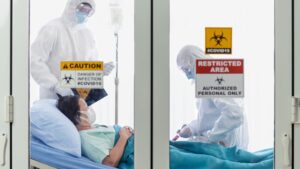
That day, Muhammad Wira’s clothing items were thicker than usual. A member of the local poll administration (KPPS) member of a polling booth in Abadi Jaya subdistrict, the Sukmajaya district in Depok, West Java, Indonesi came to the KPPS wearing a simple blue shirt on Dec. 9. Yet, upon arrival in the KPPS, he started to add an extra layer of a decontamination clothing item as well as hazmat suit. He was also wearing three layers of hand gloves, two layers of face masks as well as a face shield — these were the personal protection equipment which got attached to his body.
He had to carry so many personal protection equipment that he almost forgot to zip the hazmat suit tightly up to his neck. The collar of his blue shirt still protruded out when he was taking the votes of voters who were sequestered in COVID-19 isolation centers.
“There’s no need to mention that I’m afraid, yet I can only pray that nothing bad will happen to me,” Wira said upon our meeting on Dec. 9.
Wira was one of the polling officers who had voluntarily come to help COVID-19 patients currently undergoing self-isolation in Depok, West Java cast their votes.
[irp posts=”9592″ name=”Electoral democracy in Asia suffers during the Covid-19 Pandemic”]
Meanwhile, his other colleagues pointed their fingers at each other when they were asked which one of them would like to visit the self-isolating patients to cast the latter’s vote in the 2020 regional elections.
The KPPS chief of the same district, I Gede Dwi, had no other choice but to voluntarily offer his help to cast the patients’ votes in the regional elections. Both I Gede and Wira visited a Sukmajaya district citizen who was undergoing self-isolation. Behind the gate of the house, he discovered three family members gathering inside the home compound. One of them was a small child.
Contrary to the Depok city health agency’s advise for the polling officers to simply conduct the voting process outdoors, these family members asked I Gede to enter their home.
The agency has advised all voting processes to be conducted outdoors within a safe distance of 1.5 meter. Inside the three by three room, Dwi even forgot to provide the patients some hand gloves. “We wanted to rush the process [due to our fear and anxiety], we forgot to implement the health and hygiene protocols,” he said.
Based on data from the Sukmajaya district and the Depok city health agency, the Sukmajaya voting booth had only one COVID-19 voter in self-isolation. Meanwhile, the local COVID-19 information and coordination center showed that Sukmajaya was the district with the highest number of active COVID-19 patients.
[irp posts=”9379″ name=”Elections, the pandemic and democracy: parallels between Myanmar and Indonesia”]
Meanwhile, data from the Indrapura Emergency Field Hospital in Surabaya, East Java pointed out there were at least 70 out of 240 COVID-19 patients who were registered as voters.
Febryanto Nugroho, a member of the district voting committee of Krembangan in Surabaya, said the voting officers there had no other choice to enter the isolation room because the hospital had not allowed the patients to get up from their beds. Because of this, the officers had to wear the standard personal protection equipment on the third level, with many layers of clothing items, in order to interact with the patients safely.
“We’ve coordinated closely with the hospital, which has given us high-quality personal protection equipment,” he said.
Although the hospital had provided them an up-to-standard personal protection equipment, still the voting officers were highly terrified about the prospect of entering the self-isolation room of COVID-19 patients. A KPPS member who got tasked to conduct the in-the-hospital voting process in the Wongsonegoro state hospital in Semarang, Central Java, named Purwanto said he had been quite doubtful on whether he should conduct the votes in the hospital or not.
He and his colleague kind of shoved each other on the door threshold of the isolation room. “I admit it, I was afraid. I feared the safety of my family members at home,” he said.
[irp posts=”9585″ name=”Elderly voters in the red-zone Sleman reluctant to vote”]
Upon taking a very deep breath, Purwanto gathered enough courage to just help the patient vote from the isolation room. While he was inside the isolation room, he tried his best not to touch any objects inside there.
Out of 160 people who had been registered to vote in the hospital’s isolation room. The rest just could not vote, due to the limited voting schedules available for isolation patients. The General Elections Commission (KPU) allocated only an hour for these self-isolating patients to vote: from 12 to 1 p.m.
In the Pemalang regency in Central Java, a KPPS member in the Bojongbata subdistrict called Fathin Hariz was tasked to cast the vote in the Dr. M Ashari state hospital’s isolation room for COVID-19 patients. He considered the experience as being similar to a daredevil challenge. Although he had been afraid in the beginning, he eventually gathered enough courage to meet the isolation patients directly.
“I used to work as a rapid test service provider. So yes, I had been quite afraid. None of the other KPPS members, however, had enough guts to go to the isolation centers to help the patients cast their votes there and somebody’s got to do it so I volunteered,” said Fathin, who in his daily life works as a nurse.
[irp posts=”9579″ name=”West Java’s polling stations lack of health protocol requirements”]
Upon entering the isolation room, Fathin right away handed the ballot paper and the nail which the patient would use to poke through the ballot paper. To protect the privacy regarding the patient’s choice, he turned his back on the patient as the patient was voting for a particular candidate. Then, the patient inserted the ballot paper into a plastic bag before the whole package was being sprayed by disinfectant liquid.
Article 73 of the KPU regulation no. 6/2020 about the regional leader elections process actually stipulated that the KPPS officers were allowed to visit the voters who had been suffering from COVID-19 only upon securing the approval of witnesses as well as the elections supervisory body on the district or village level. That does not mean that all patients in self-isolation are entitled to use their voting rights.
For instance, COVID-19 patients in the Merauke state hospital in Papua were not allowed to vote during the regional elections. According to Theresia Mahuze, the head of the Merauke chapter of the KPU, she could only allow patients who suffered from illnesses other than COVID-19 to cast their votes during the regional elections.
“We had previously coordinated with the hospital director so that the hospital would accommodate the voting process,” she said on Wednesday, Dec. 9.
[irp posts=”9570″ name=”Election committee confused about voting procedures for Covid-19 patients”]
The COVID-19 patients in the Sumatera Utara University (USU) as well as the Pringadi hospitals in Medan, North Sumatra, meanwhile, decided not to use their voting rights, when in fact, the voting officers had already offered to help them cast their votes from their isolation centers, at home or in the hospital.
“We’ve asked the patients’ families to register their family members [to join the voting process] but none of them did,” said the USU hospital public relations Muhammad Zeinize.
The total number of patients in the Dr Pirngadi hospital in Medan who did not vote during the regional elections, meanwhile, amounted to 58 people. Out of the number, 12 were COVID-19 patients. (Debora Blandina Sinambela)







